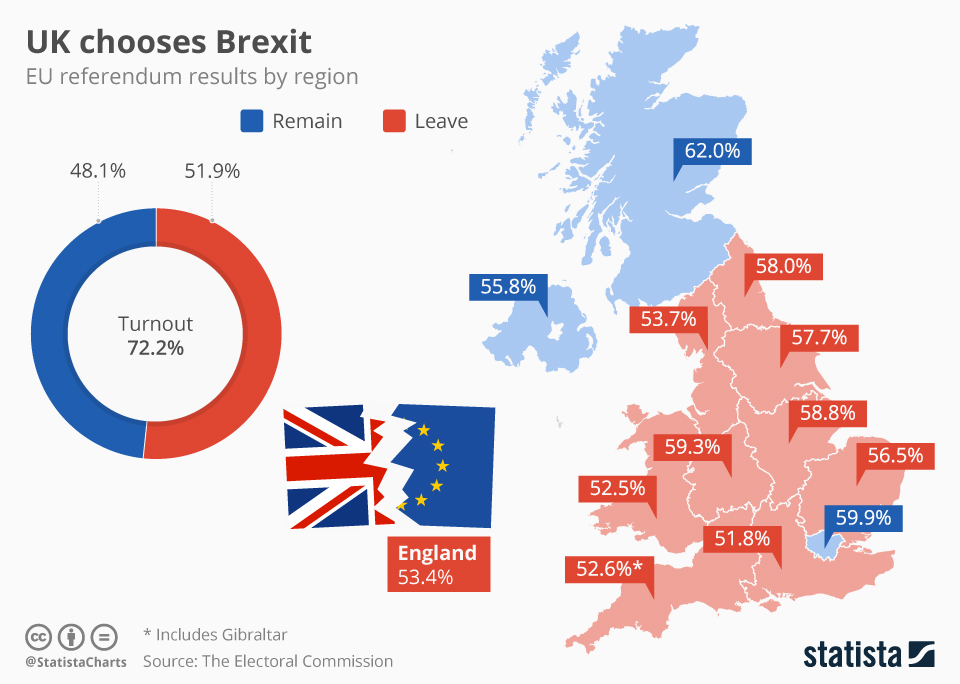United Kingdom more divided than ever after Brexit referendum
Employment and Social Affairs 27 June 2016Britain has awakened more divided than ever in the aftermath of the referendum on Brexit. While England and Wales voted in majority to leave the EU, Northern Ireland, Scotland, and London voted to remain. What will be the future of those wishing to stay?
The vote on the referendum of Britain to decide whether to stay or leave the EU was mainly a generational clash between young and old. Youngsters and generally those with a mortgage voted to remain, while elderly people, especially those enjoy pensions, to leave.
Retirees voted to leave because of the fear of immigration, the contempt for the eurocrats, the nostalgia for the greatness of the British Empire. Young people, instead, recognize themselves in the European project of the Erasmus programme and the cultural exchanges, which are now in crisis, since the programme beloved by students from all over Europe will have to be renegotiated as other trade agreements. Besides, university tuitions in the UK will be higher for other EU citizens. In any case, what will be the future of Northern Ireland, Scotland, and London, which voted to stay?
Are Scotland and Nothern Ireland about to leave the UK?
In Scotland, where the possibility to remain was vote by 62% of voters, the Prime Minister Nicola Sturgeon announced that her Government will ask for the immediate start of discussions with Brussels to allow Scotland to remain in the European Union and overcome the problem of Brexit. Furthermore, a second Scottish referendum independence seems as “very much on the table” for Sturgeon. Indeed, as showed by an online poll in the Sunday Post newspaper last weekend, 59% of Scots are now favouring independence, compared to less than two years ago, when they voted with a 55 percent majority to stay part of the UK.
Brexit has rekindled old passions in Northern Ireland, where another referendum is invoked on the reunification with the Republic of Ireland, as Dublin faithfully belongs to the European Union. Under the Good Friday agreement, the secretary of state is entitled to call a border poll when there is clear indication that public opinion has swung towards a united Ireland. Almost 20 years have passed since the agreement that brought peace in the region was reached, and Northern Ireland has flourished and enjoyed relative peace so far. But now growth achieved thanks to EU funding and a hard-won peace are at stake. Although they voted against leaving the EU, it is unclear whether people of Northern Ireland will vote to leave the UK.
London, a capital wishing to abandon its country.
Even London, an international city that voted remain up to 60%, wishes now to quit the United Kingdom. Petitions to challenge the outcome of the referendum have been already set up. Indeed, the primacy of the City as a major financial centre in Europe is at risk. London property market will be in crisis because banks, start-ups, fashion houses and other companies might leave the City with the exit from the European Union.
European capitals are now competing against London as a major financial centre. For example, Frankfurt could become the new main stock exchange in Europe and US banks may transfer there their European offices. Dublin also can attract the headquarters of us banks, as it speaks English. we talk about 2000 employees. Milan could become the capital of fashion and attract students and start-ups. Brokers are also looking towards Paris.
For more information on the election of Sahid Khan, read “The mayor of London: son of migrants who won islamophobia.”
Nevertheless, even in London, which has found in its new mayor of Pakistani origins its main representative, it exists an enclave that voted to leave the European Union, namely Hillingdon, Boris Johnson’s neighbourhood in West London. For this people, the devaluation of pound or real estate agent market crisis is no matter. The only important thing that counts is to control the flow of immigrants.
For more information on the Brexit consequences, read NEU’s selection of articles here.



